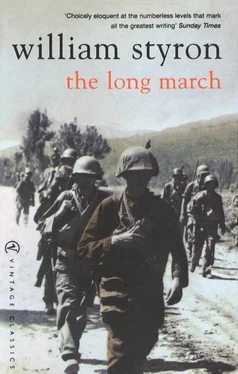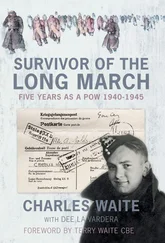William Styron - The Long March
Здесь есть возможность читать онлайн «William Styron - The Long March» весь текст электронной книги совершенно бесплатно (целиком полную версию без сокращений). В некоторых случаях можно слушать аудио, скачать через торрент в формате fb2 и присутствует краткое содержание. Город: New York, Год выпуска: 1952, ISBN: 1952, Издательство: Vintage Classics, Жанр: prose_military, на английском языке. Описание произведения, (предисловие) а так же отзывы посетителей доступны на портале библиотеки ЛибКат.
- Название:The Long March
- Автор:
- Издательство:Vintage Classics
- Жанр:
- Год:1952
- Город:New York
- ISBN:978-0099422792
- Рейтинг книги:3 / 5. Голосов: 1
-
Избранное:Добавить в избранное
- Отзывы:
-
Ваша оценка:
- 60
- 1
- 2
- 3
- 4
- 5
The Long March: краткое содержание, описание и аннотация
Предлагаем к чтению аннотацию, описание, краткое содержание или предисловие (зависит от того, что написал сам автор книги «The Long March»). Если вы не нашли необходимую информацию о книге — напишите в комментариях, мы постараемся отыскать её.
The Long March — читать онлайн бесплатно полную книгу (весь текст) целиком
Ниже представлен текст книги, разбитый по страницам. Система сохранения места последней прочитанной страницы, позволяет с удобством читать онлайн бесплатно книгу «The Long March», без необходимости каждый раз заново искать на чём Вы остановились. Поставьте закладку, и сможете в любой момент перейти на страницу, на которой закончили чтение.
Интервал:
Закладка:
Mannix despised the Colonel. Yet, Culver thought, as the Captain hulked stiff-kneed behind the Colonel and disappeared after him into the operations tent, Mannix despised everything about the Marine Corps. In this attitude he was like nearly all the reserves, it was true, but Mannix was more noisily frank in regard to his position. He detested Templeton not because of any slight or injustice, but because Templeton was a lieutenant colonel, because he was a regular, and because he possessed over Mannix—after six years of freedom—an absolute and unquestioned authority. Mannix would have hated any battalion commander, had he the benignity of Santa Claus, and Culver, listening to Mannix’s frequently comical but often too audible complaints, as just now, was kept in a constant state of mild suspense—half amusement, half horror. Culver settled himself against the tree. Apparently there was nothing, for the moment at least, that he could do. Above him an airplane droned through the stillness. A truck grumbled across the clearing, carrying a group of languid hospital corpsmen, was gone; around him the men lay against their packs in crumpled attitudes of sleep. A heavy drowsiness came over him, and he let his eyes slide closed. Suddenly he yearned, with all of the hunger of a schoolboy in a classroom on a May afternoon, to be able to collapse into slumber. For the three days they had been on the problem he had averaged only four hours of sleep a night— almost none last night—and gratefully he knew he’d be able to sleep this evening. He began to doze, dreaming fitfully of home, of white cottages, of a summer by the sea. Long walk tonight. And his eyes snapped open then —on what seemed to be the repeated echo, from afar, of that faint anguished shriek he had heard before—in the horrid remembrance that there would be no sleep tonight. For anyone at all. Only a few seconds had passed.
“Long walk tonight,” the voice repeated. Culver stared upward through a dazzling patchwork of leaves and light to see the broad pink face of Sergeant O’Leary, smiling down.
“Christ, O’Leary,” he said, “don’t remind me.”
The Sergeant, still grinning, gestured with his shoulder in the direction of the operations tent. “The Colonel’s really got a wild hair, ain’t he?” He chuckled and reached down and clutched one of his feet, with an elaborate groan.
Culver abruptly felt cloaked in a gloom that was almost tangible, and he was in no mood to laugh. “You’ll be really holding that foot tomorrow morning,” he said, “and that’s no joke.”
The grin persisted. “Ah, Mister Culver,” O’Leary said, “don’t take it so hard. It’s just a little walk through the night. It’ll be over before you know it.” He paused, prodding with his toe at the pine needles. “Say,” he went on, “what’s this I heard about some short rounds down in Third Batt?”
“I don’t know from nothing, O’Leary. I just read the papers.” Another truck came by, loaded with corpsmen, followed by a jeep in which sat the helmeted Major Lawrence, a look of sulky arrogance on his face, his arms folded at his chest like a legionnaire riding through a conquered city. “But from what I understand,” Culver went on, turning back, “quite a few guys got hurt.”
“That’s tough,” O’Leary said. “I’ll bet you they were using that old stuff they’ve had stored on Guam ever since ’45. Jesus, you’d think they’d have better sense. Why, I seen those shells stacked up high as a man out there just last year, getting rained on every day and getting the jungle rot and Jesus, they put tarps over ’em but five years is one hell of a long time to let 81-shells lay around. I remember once…” Culver let him talk, without hearing the words, and drowsed. O’Leary was an old-timer (though only a few years older than Culver), a regular who had just signed over for four more years, and it was impossible to dislike him. On Guadalcanal he had been only a youngster, but in the intervening years the Marine Corps had molded him—perhaps by his own unconscious choice—in its image, and he had become as inextricably grafted to the system as any piece of flesh surgically laid on to arm or thigh. There was great heartiness and warmth in him but at the same time he performed all infantry jobs with a devoted, methodical competence. He could say sarcastically, “The Colonel’s really got a wild hair, ain’t he?” but shrug his shoulders and grin, and by that ambivalent gesture sum up an attitude which only a professional soldier could logically retain: I doubt the Colonel’s judgment a little, but I will willingly do what he says. He also shared with Hobbs, the radioman, some sort of immunity. And thus it had been last night, Culver recalled, that upon the Colonel’s announcement about this evening’s forced march—which was to take thirteen hours and extend the nearly thirty-six miles back to the main base—O’Leary had been able to give a long, audible, incredulous whistle, right in the Colonel’s face, and elicit from the Colonel an indulgent smile; whereas in the same blackout tent and at virtually the same instant Mannix had murmured, “Thirty-six miles, Jesus Christ,” in a tone, however, laden with no more disbelief or no more pain than O’Leary’s whistle, and Culver had seen the Colonel’s smile vanish, replaced on the fragile little face by a subtle, delicate shadow of irritation.
“You think that’s too long?” the Colonel had said to Mannix then, turning slightly. There had been no hostility in his voice, or even reproof; it had, in fact, seemed merely a question candidly stated—although this might have been because two enlisted men had been in the tent, O’Leary, and some wizened, anonymous little private shivering over the radio. It was midsummer, but nights out in the swamps were fiercely, illogically cold, and from where they had set up the operations tent that evening—on a tiny patch of squashy marshland—the dampness seemed to ooze up and around them, clutching their bones in a chill which extra sweaters and field jackets and sweatshirts could not dislodge. A single kerosene pressure-lamp dangled from overhead—roaring like a pint-sized, encapsuled hurricane; it furnished the only light in the tent, and the negligible solace of a candlelike heat. It had the stark, desperate, manufactured quality of the light one imagines in an execution chamber; under it the Colonel’s face, in absolute repose as he stared down for a brief, silent instant and awaited Mannix’s reply, looked like that of a mannequin, chalky, exquisite, solitary beneath a store-window glare.
“No, sir,” Mannix said. He had recovered quickly. He peered up at the Colonel from his camp stool, expressionless. “No, sir,” he repeated, “I don’t think it’s too long, but it’s certainly going to be some hike.”
The Colonel did something with his lips. It seemed to be a smile. He said nothing—bemused and mystifying—wearing the enigma of the moment like a cape. In the silence the tempestuous little lamp boiled and raged; far off in the swamp somewhere a mortar flare flew up with a short, sharp crack. O’Leary broke the quietness in the tent with a loud sneeze, followed, almost like a prolongation of the sneeze, by a chuckle, and said: “Oh boy, Colonel, there’re gonna be some sore feet Saturday morning.”
The Colonel didn’t answer. He hooked his thumbs in his belt. He turned to the Major, who was brooding upward from the field desk, cheeks propped against his hands. “I was sitting in my tent a while ago, Billy,” the Colonel said, “and I got to thinking. I got to thinking about a lot of things. I got to thinking about the Battalion. I said to myself, ‘How’s the Battalion doing?’ I mean, ‘What kind of an outfit do I have here? Is it in good combat shape? If we were to meet an Aggressor enemy tomorrow would we come out all right?’ Those were the queries I posed to myself. Then I tried to formulate an answer.” He paused, his eyes luminous and his lips twisted in a wry, contemplative smile as if he were indeed, again, struggling with the weight of the questions to which he had addressed himself. The Major was absorbed; he looked up at Templeton with an intent baby-blue gaze and parted mouth, upon which, against a pink cleft of the lower lip, there glittered a bead of saliva. “Reluctantly,” the Colonel went on slowly, “reluctantly, I came to this conclusion: the Battalion’s been doping off.” He paused again. “Doping off. Especially,” he said, turning briefly toward Mannix with a thin smile, “a certain component unit known as Headquarters and Service Company.” He leaned back on the camp stool and slowly caressed the pewter-colored surface of his hair. “I decided a little walk might be in order for tomorrow night, after we secure the problem. Instead of going back to the base on the trucks. What do you think, Billy?”
Читать дальшеИнтервал:
Закладка:
Похожие книги на «The Long March»
Представляем Вашему вниманию похожие книги на «The Long March» списком для выбора. Мы отобрали схожую по названию и смыслу литературу в надежде предоставить читателям больше вариантов отыскать новые, интересные, ещё непрочитанные произведения.
Обсуждение, отзывы о книге «The Long March» и просто собственные мнения читателей. Оставьте ваши комментарии, напишите, что Вы думаете о произведении, его смысле или главных героях. Укажите что конкретно понравилось, а что нет, и почему Вы так считаете.






![Джеффри Арчер - The Short, the Long and the Tall [С иллюстрациями]](/books/388600/dzheffri-archer-the-short-the-long-and-the-tall-s-thumb.webp)





